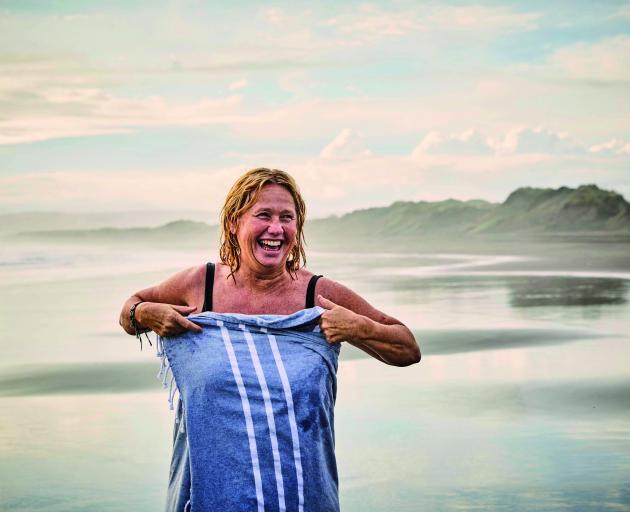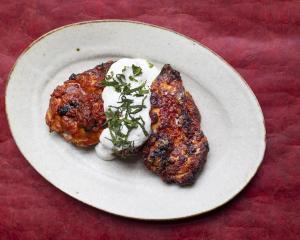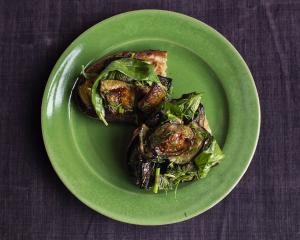
Nici Wickes has always thought she could make a good camp mother.
Yet, as she has not had children, she has never had the opportunity until recently when she was asked to cook for school groups staying in her small seaside village of Port Waikato.
‘‘I’ve never had the kids but I’ve always wanted to do the cooking for the kids so I jumped at the chance. I’ve really adored it.’’
Wickes also remembers her mother, another good cook, always attending her school camps as the cook.
‘‘It was a blessing as we had amazing food but it wasn’t such a blessing as she could keep an eye on me. I always thought I’d be good at it too.’’
So last summer she relished the opportunity to get stuck in and cook some wholesome, tasty food for the school groups aged 12 to 16.
‘‘It’s been fun cooking really nice food. Kids on school camps these days apparently are quite used to having really terrible food.’’
While well known for her recipes for one or two people, cooking for 30 or 40 does not faze her thanks to her chef’s training and years as a food writer. Many of her recipes can be scaled up although, as a general rule of thumb, not every ingredient is scaled up identically when she does it for that many people - the protein yes, but not the spices or liquid.
‘‘It’s a breeze. I love it.’’
Even her favourite home-made baked beans find favour, although it takes a little lecture about the health benefits of eating beans and legumes to get the children truly interested in trying them, she says.
‘‘After that it’s ‘Miss, can I have some beans’ and they’re telling me how delicious they are. They eat like the proverbial horses.’’
Other favourites are a slow-cooked chicken or pork which goes into bao buns and the ‘‘dead easy’’ chicken pie made with creme fraiche and stock instead of a time-consuming white sauce.
‘‘It’s not difficult food, just amazing and full of flavour.’’
While there is a tight budget for food for these camps, a lot can be accomplished with herbs, spices and legumes to bulk things out and create amazing flavour.
Another bonus of the experience, Wickes says, is getting an opportunity to eat one of her weaknesses - hot dogs, albeit using good-quality frankfurters and soft rolls.
‘‘I love it. I won’t eat that at home but I love doing it at camp. It’s fantastic fun.’’
Just like doing food festivals.
Wickes loves nothing more than sharing her passion for good-quality food and cooking with others and has done so since she discovered she had the ability to talk and cook at the same time.
‘‘I get to share a huge amount of knowledge and people can go away with lots of tips and ideas to take back home and try. So I try and cram as much in as I can.’’
This month, she is doing two seafood festivals at either end of the country, which she enjoys as she is a fan of cooking seafood.
‘‘It’s such a quick meal and doesn’t take a lot to cook. It bridges all seasons. It can be a hearty chowder in winter or a beautiful Mediterranean soup in summer.’’
Some people are afraid of overcooking fish but Wickes says she always remembers British chef Rick Stein’s comment that white fish only needs warmed through as it keeps cooking after it leaves the pan.
‘‘Keep testing it to see that it is opaque all the way through. It doesn’t take as much cooking as you think.’’
While some seafood can be expensive, mussels in the shell are an affordable, good-quality protein which can be cooked in next to no time. Two to three mussels in the shell per fritter are all that are needed.
‘‘I’ll probably do my mussel fritters at the festival but with a twist.’’
She advises people not to be afraid to ask supermarket staff for a ‘‘sniff test’’ when buying fish to ensure it is fresh and does not smell too ‘‘fishy’’.
It is high-protein food and quite filling so not as much is needed per person and it can easily be bulked out by serving it with tomatoes and olives or some wilted spinach, she says.
‘‘It lends itself to some great flavours - you could crumb a piece of fish and put it in a warm bun.’’
Fritters are another way to use seafood of all types, chopped up with seasonings and vegetables.
‘‘They are quick and easy and seafood is incredibly healthy. I’d try to eat seafood at least once a week.’’

Being mindful of the sustainability of some fish, it is important to try different, less-common varieties and also to make more of an effort to use all parts of the fish, like dusting fish wings in flour and frying them.
So using the head and skeleton in stocks and the blood and guts to fertilise your garden is important, she says.
‘‘I’ve heard if you are eating a fillet of fish you are only eating 35% of the fish. It’s not a lot. It’s crazy to throw away 65% of a fish.’’
She also enjoys using the flavours of the Mediterranean and South East Asia in her cooking.
‘‘I love using recipes that might originate from somewhere else but using our local produce. Nothing makes me happier. I love travelling on my tastebuds.’’
Wickes is not a fisherperson herself as she gets seasick, but she does appreciate living close to the ocean, taking a dip most days, even in winter.
It is something that helps her mental health, which she discovered about four years ago after she kept swimming after summer ended.
She discovered there was science behind the effect of cold water immersion.
‘‘I find it relaxing and it holds at bay any anxiety. I’m very much a dipper - I go under three waves, it’s a surf beach. I’m in and out in a few minutes, it’s not too onerous and works for me.’’
She admits to often not wanting to go in but it has become a habit she can see continuing for the rest of her life - including her visit to Dunedin this month. She is planning to brave a dip at St Clair or St Kilda - something she has not tried in Dunedin for many years.
‘‘I’m wading in going ‘I hate this’, then I’m under the water and out and I feel fantastic. Everything feels warm afterwards.’’
Wickes has a soft spot for Dunedin, having lived and studied here for five years while completing her physical education and psychology degrees. She spent her first year at Knox College before flatting in Leith St.
‘‘I forged lifelong friendships there. Dunedin is very dear to my heart, it has some lovely little gems. It has some great eating spots and that is what I travel for.’’
Originally she was thinking of becoming a physical education teacher but never pursued it and ended up in the corporate world doing leadership training.
However, in her 30s she began to think it was not a long-term career for her and took time off to study to be a chef. But the paycheck of her former career lured her back for another six or seven years, allowing her to buy a house.
‘‘I was burnt out. I was a business coach advising people to live their passion but not doing it myself. So I packed it in.’’
Very soon afterwards, she was ‘‘incredibly lucky’’ to win the audition to present World Kitchen, a travel and food television programme that she did five series of.
‘‘I got to travel the world. It was great.’’
Wickes went on to be The New Zealand Herald’s Viva magazine food editor and then the New Zealand Women’s Weekly food editor, writing and testing hundreds of recipes until she lost her job when the magazine closed due to Covid-19.
‘‘I’ve had some good opportunities which I’ve embraced.’’
She also realised her superpower has always been knowing what things will taste like when combined, even if she has never tried it before.
‘‘I have the odd failure but not many. We all have our skills and that is my particular one. Like any cook, I cook with the seasons.’’
Covid-19 was the first time in her self-employed life when she was not working and gave her the rare opportunity to slow down and enjoy life at home.
She now lives in Port Waikato full-time and travels for festivals and other food gigs.
‘‘I’m a mix of someone who leads a very private life with a very public life and I enjoy both of them equally. I love meeting readers and then I scuttle away back oceanside and to my cat Joshua until I emerge again.’’
While not a natural gardener, Wickes does have some spinach, leeks and herbs growing in a plot which is often tended by her mother when she visits.
‘‘She loves gardening like I love cooking. When people try to help in the kitchen they’re taking away something I love doing.’’
Earlier this year, she also released her latest book A Quiet Kitchen, a collection of recipes for one or two, along with her reflections of living solo, being middle-aged and childless and the other challenges life has thrown at her.
‘‘And I live in a really small community so I shared a lot of that so it really resonated with a lot of people as well.’’
Such as getting Covid-19 and discovering for the first time in her life she had lost her appetite and interest in food. Previously she had never understood how people struggled to work out what to eat or cook.
‘‘I was like, ‘Oh no, is this what it’s like for regular people?’ I was concerned it might never come back but I really coaxed it back, watching more food TV and re-reading some of my Nigel Slater books. He describes food so beautifully. It gave me a window into those people who say, ‘what can I cook for dinner?’’’
And she is most grateful it has come back. She is just finishing up another book of recipes for one or two that will be out next year.
‘‘It’s required a lot of work and a lot of writing too.’’
Also appearing in the Port Chalmers festival’s culinary pavilion is former fisherman and chef Matt Lewis, from His and Hers Catering in Port Chalmers, and Mikey and Dan, from Dunedin’s Mikey’s Kai food truck.
TO SEE
Nici Wickes - Port Chalmers Seafood Festival
September 30,
11am to 5pm, culinary pavilion.

Spiced mussel fritters
Makes 6-8
I make all manner of fritters and these mussel ones are just so good. They would work just as well with grated carrot or peas, prawns or chopped fish.
A fritter can shift my mood from blah to YAY in one crispy bite!
Ingredients
10-12 cooked mussels, removed from the shell and roughly chopped
1 small onion, finely chopped
1 handful chopped coriander and/or chopped celery leaves
1 large red chilli, deseeded and finely diced (or 1 tsp chilli flakes)
½ tsp curry powder
½ tsp ground turmeric
1 cup roughly chopped spinach leaves
1 large egg
2 Tbsp self-raising flour
salt and pepper
oil for shallow-frying
a squeeze of lemon juice to serve
Method
In a medium-sized bowl, combine the mussels, onion, coriander, chilli, curry powder, turmeric and spinach.
Add the egg and mix with a fork. Add the flour and seasoning. The mixture should be of a dropping consistency.
Heat a heavy-based frying pan on a medium heat with enough oil to shallow-fry the fritters. When the oil is sizzling, drop heaped tablespoons of the fritter batter into the hot oil. Lower the heat and cook on both sides until golden.
Squeeze over some lemon juice and eat!
Note: Pour boiling water over the mussels to open the shells.











